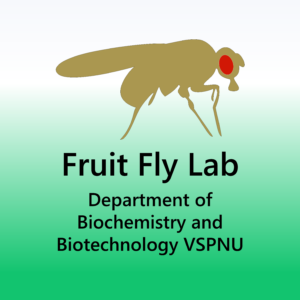Drosophila research at our facility is applicable to a vast range of research areas, including many aspects of biomedical science, gerontology, metabolism, and on pest control.
The Department of Biochemistry and Biotechnology has a strong history of Drosophila research which has continued to the present day. The fruit fly Drosophila melanogaster is the most powerful model organism to investigate fundamental biology and reveal possible mechanisms of various human diseases. The Fruit Fly Facility manages and maintains more than 50 different genetic strains of Drosophila and provides a range of technical services, including performing genetic crosses, setting up population cages to run experiments, prepare organ samples for further experiments. Our facility consists of a main room for experiments, a temperature-controlled room for Drosophila breeding at 25°C, and a temperature-controlled room for the maintaining of fly strains at 18°C. Moreover, the Fruit Fly Facility is equipped with an incubator with the space to culture flies at different temperatures. The lab also has several water baths available for heat-shocking flies, as well as a fume hood. Many types of fly food in a variety of containers could be prepared in the lab. The team of the Fruit Fly Facility provides technical training for researchers, including on using microscopes, CO2 equipment, and aspects such as identifying the sex of flies and organ preparations. We provide introductions for scientists who want to start working with the Drosophila model, offer advice for planning experiments, as well as introductions to our equipment. Our staff have many years of experience in Drosophila maintaining and experiments and can help you optimize your fly work.
- Thermostated rooms with temperatures 18 °C (strain storage) and 25 °C (cultivation room) and humidity 50-60%; temperature safety device BINDER;
- CO2 pad system;
- Microwaves for food preparation;
- Centrifuges: Eppendorf Mini Spin centrifuge, Eppendorf 5415-R centrifuge;
- Microscopy and imaging: Luminescent microscope Micromed Evolution LUM LS-8530, ZOE™ Fluorescent Cell Imager; Two OPTIKA (Italy) binocular microscopes, two Leica binocular microscopes;
- Freezers: ULUF 450-2M Ultra Low Temperature Freezer, Low-temperature refrigerator HTN-10;
- pH-meters: pH meter 150 MI, pH meter OHAUS AB23PH, portable pH meter;
- Balances: analytical balance RADWAG AS220R2, torsion scales TW 2, electric scales (AXIS, VTU 210);

